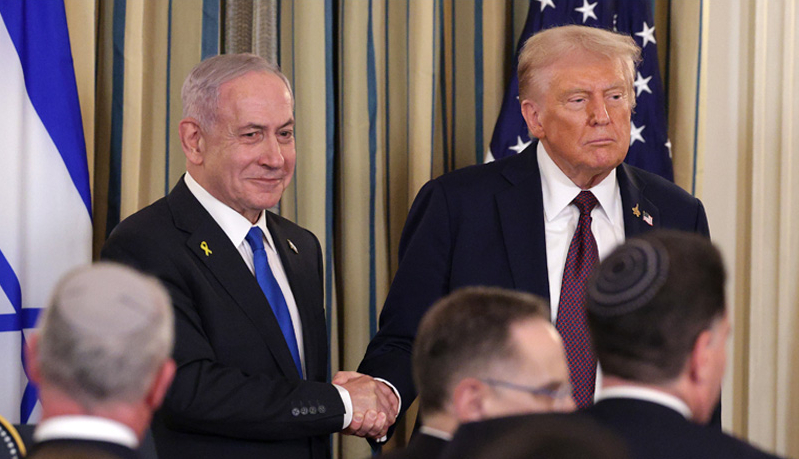
The recent assertion by Israel's President Netanyahu, that his country is the sole thriving sanctuary for Christians in the Middle East, is a claim that demands a clear, honest, and prophetic response.
As an Evangelical leader and indigenous to the Holy Land, I value the historic connection of my faith to this land, but I refuse to let that theological appreciation blind me to the complexities on the ground or, more critically, the mounting injustices. The narrative of modern Israel as the only haven is not just incomplete, it actively obscures a troubling reality within its own borders and dismisses the tenacious resilience of our brothers and sisters in surrounding nations.
Christian communities, despite significant challenges, are not just surviving but maintaining a profound, millennia-old presence in several Middle Eastern countries.
The simple, verifiable truth is that Christian communities, despite significant challenges, are not just surviving but maintaining a profound, millennia-old presence in several Middle Eastern countries, places that are often unfairly painted with a broad, uniform brush of persecution.
Consider these few examples (I could give more):
- Egypt: The Coptic Orthodox community, numbering millions, is the largest Christian body in the entire Middle East this is in addition to the hundreds of thousands of Protestants, Evangelicals, and Catholic Christians in Egypt. While they certainly face security and societal challenges, they are an indispensable part of Egypt's social and cultural fabric. Their sheer numbers and deep historical roots are a testament to their enduring presence and active communal life.
- Lebanon: Christians constitute a significant percentage of the population, holding constitutionally-mandated political power, including the Presidency at the moment. The country's struggles today are primarily economic and political, affecting all citizens, not a targeted religious cleansing against Christians. The Maronite, Orthodox, Protestants, and Evangelicals alongside other traditions are vibrant, active, and essential to the national identity, the president is even a Christian and he witnessed to this fact in the last UN general assembly.
- Jordan: Christians are a respected and integrated community and part and parcel of the fabric or the Jordanian society, estimated at around 4% of the population, with dedicated parliamentary seats. They are actively involved in the country's social, educational, and political life, often seen as a key component of its stability.
To suggest that these millions of Christians, with their ancient churches, vast educational institutions, and deeply woven cultural influence, are simply languishing while only Israel's small Christian community (about 2% of the population) is thriving is to misunderstand or willfully misrepresent the facts. It is a rhetorical device designed to secure Western, particularly Evangelical, support, not an accurate reflection of the regional Christian experience.
The disturbing reality within Israel
The call for truth becomes even more urgent when we examine the state of Christian life within Israel and the Palestinian territories under its control. A disturbing and documented rise in threats, vandalism, and harassment severely undermines the image of a protected community.
Frequent and sustained attacks against clergy, churches, and Christian property by extremist elements within Israel.
Reports from local church leaders, including the Patriarchs and Heads of Churches in Jerusalem, have repeatedly raised the alarm about frequent and sustained attacks against clergy, churches, and Christian property by extremist elements within Israel.
We have seen:
- An alarming rise in incidents of physical and verbal assaults against priests and other clergy.
- Widespread vandalism and desecration of Christian holy sites.
- Concerns from Christian leaders about systematic attempts by radical groups to drive the Christian community out of Jerusalem and other parts of the Holy Land.
The alarming pressure on Christian institutions through municipal tax levies and the freezing of church bank accounts, which threatens their financial viability and their very presence in the Holy Land.
The narrative of thriving protection becomes utterly hollow.
When Israeli and international Jewish organizations feel compelled to condemn these attacks and call upon Israeli law enforcement to protect Christians, the narrative of thriving protection becomes utterly hollow. It is a tragic irony that the place where Christianity was born is becoming increasingly hostile to its indigenous followers.
The Evangelical dilemma: recognition over rhetoric
This leads me to a painful but necessary critique of my own Evangelical community's relationship with the State of Israel. For years, the powerful, unwavering support of Evangelicals, often driven by the fixation on a particular eschatological (end times) interpretation, has been a diplomatic and financial lifeline for Israel. Yet, in return for this unqualified allegiance, Christians who have lived here for many generations, receive a status that is, frankly, insulting.
Israel officially recognizes ten Christian churches, mostly the historic Orthodox and Catholic denominations, which allows them certain rights, particularly concerning family law (like marriage and divorce). Where do Evangelicals stand? In many cases, we are not recognized as a valid religious denomination. Instead, our vital ministries—our churches, schools, hospitals, and humanitarian aid groups—are often forced to register as small, non-profit organizations, an Amutah.
It forces indigenous Evangelicals into a category of being something like a friendly foreign entity.
This bureaucratic distinction is a form of calculated discrimination. It strips us of the inherent rights and recognition afforded to established faiths. It forces indigenous Evangelicals into a category of being something like a friendly foreign entity rather than a legitimate, indigenous, religious community.
Israel wants the political muscle and donations of Evangelicals worldwide, but it refuses to recognize our theological existence as a valid entity, subjecting our clergy and workers to bureaucratic hurdles, as was recently highlighted by visa issues that required U.S. diplomatic intervention (which is documented in official reports).
Pastors and Evangelical leaders in this country, including me, understand this. We understand that Israel is effectively telling the worldwide Evangelical community:
You are useful, but you are not equal. You are an ally to be courted, but not a community to be integrated or respected as a legitimate branch of Christianity within the historic homeland of Christianity.
A call for prophetic witness
The time has come for Evangelical leaders to move beyond a simplistic, uncritical support for the modern political state in Israel based on a narrowly selective reading of prophecy. Our commitment to Israel, the land, and its people, must be tempered and guided by our highest calling: following Jesus in the pursuit of justice and truth.
We must realize that the most loving action we can take has to be prophetic. This means, we must:
- Stop the lip service: Unconditional support has failed to foster genuine equality or halt the rising tide of anti-Christian extremism in modern Israel.
- Demand accountability: We must use our influence to call out the Israeli state for its failure to protect Christians, churches, and clergy from extremist attacks and demand full legal and religious recognition for all Evangelical bodies.
- Stand for all: The love that Evangelicals have for the Jewish people must not negate our solidarity with the Palestinian Christians and Muslims who suffer under discriminatory policies, land confiscation, and occupation. The biblical call for justice is universal.
Do what is just and right.
This is what the Lord says: “Do what is just and right. Rescue from the hand of the oppressor the one who has been robbed. Do no wrong or violence to the foreigner, the fatherless or the widow, and do not shed innocent blood in this place.” Jeremiah 22:3
The true measure of a state's commitment to religious freedom is not how it treats the few who offer political allegiance, but how it protects the vulnerable, respects all faiths equally, and actively stops persecution from within its own society.
Until the threats against our churches in the Holy Land cease, until our Evangelical denominations are fully recognized, and until all non-Jews are treated with dignity and equality, the claim that "only in Israel are Christians thriving" will remain a self-serving myth that the global Evangelical community must prophetically challenge and dismantle. Our faith demands nothing less than the truth.
“Learn to do good; seek justice, correct oppression; bring justice to the fatherless, and please the widow’s cause.” Isaiah 1:17
Rev. Dr. Jack Sara is the President of Bethlehem Bible College. Born and raised in the Old City of Jerusalem, Jack studied at Bethlehem Bible College after committing his life to Christ and his teachings. Jack is an ordained minister with Evangelical Alliance Church in the Holy Land where he still maintains an overseeing role with the leadership of the churches. He is the General Secretary for the Middle East & North Africa Evangelical Alliance and works extensively in the areas of peace & reconciliation.






